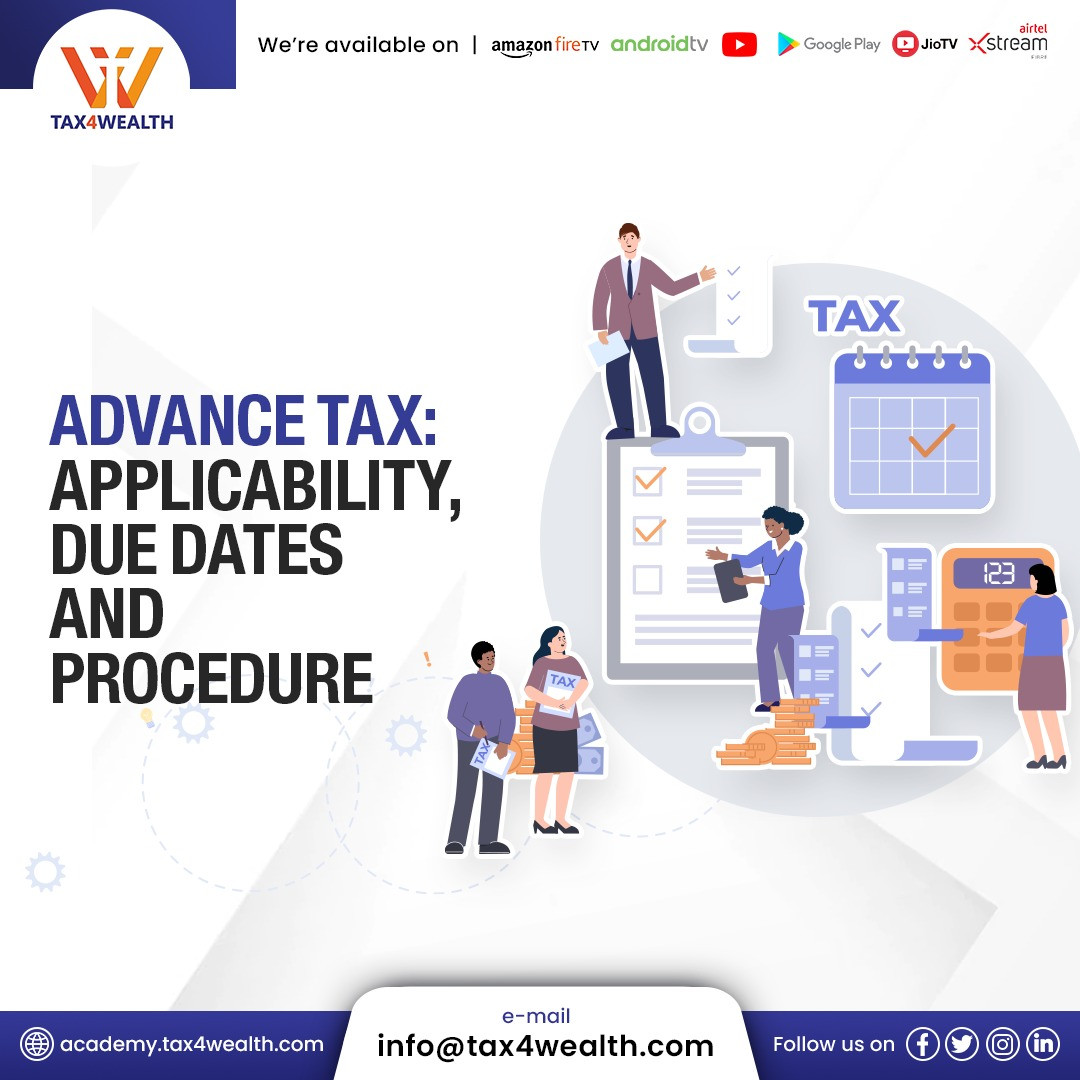
Advance Tax: Applicability, Due Dates and Procedure
Advance tax, often overlooked or misunderstood, is a crucial component of responsible financial management. Rather than facing a hefty lump sum payment at the end of the fiscal year, advance tax allows individuals and businesses to contribute towards their tax liability throughout the year proactively. In simpler terms, it's the tax you pay as you earn, spread across several instalments, as mandated by the income tax department.
A. Who Should Consider Advance Tax?
Advance tax is a requirement for various segments of taxpayers, encompassing salaried individuals, freelancers, and businesses alike. If your total tax liability exceeds Rs 10,000 in a financial year, you must pay advance tax. This rule applies uniformly to all taxpayers, irrespective of their professional status.
However, there's an exception for senior citizens. Individuals aged 60 years or more, who do not operate a business, are exempt from paying advance tax. This means that only senior citizens with business income are mandated to fulfil their advance tax obligations.
B. Special Considerations for Businesses and Professionals :
For businesses operating under the presumptive taxation scheme outlined in section 44AD, the entire advance tax amount must be paid in a single instalment on or before 15 March. Alternatively, businesses also have the flexibility to settle their entire tax dues by 31 March.
Independent professionals falling under the presumptive scheme defined in section 44ADA, such as doctors, lawyers, architects, etc., share a similar obligation. They are required to remit their entire advance tax liability in a single instalment on or before 15 March, with the option to complete the payment by 31 March.
Understanding and complying with advanced tax regulations is not just a legal obligation; it's a strategic move towards efficient financial planning. By embracing the concept of paying taxes as you earn, individuals and businesses can avoid the financial strain associated with a lumpsum payment at the year-end and foster a more proactive approach to managing their financial responsibilities. So, whether you're a salaried employee, a freelancer, or a seasoned professional, incorporating advance tax into your financial strategy is a wise step towards fiscal prudence and peace of mind.
C. Advance Tax Due Dates for FY 2023-24 :
1. For both individual and corporate taxpayers:
✅ On or before 15th June - 15% of the total advance tax amount is due.
✅ On or before 15th September - 45% of the advance tax, minus any advance tax already paid, is required.
✅ On or before 15th December - 75% of the advance tax, reduced by the advance tax already paid, is to be paid.
✅ On or before 15th March - The remaining 100% of the advance tax, adjusted for any advance tax already paid, is due.
2. For taxpayers who have chosen the Presumptive Taxation Scheme under sections 44AD & 44ADA for Business Income:
✅ On or before 15th March - The entire 100% of the advance tax amount is required.
D. Process of Advance Tax payment :
Paying advance tax online in India is a convenient way to meet your tax obligations throughout the year. Here's a step-by-step guide on how to do it:
1. Determine your advance tax liability:
✅ Before you make any payments, you need to estimate your total taxable income for the financial year.
✅ You can use the Income Tax Department's advance tax calculator to get an estimate.
2. Calculate your advance tax instalments:
✅ Once you know your estimated taxable income, you can calculate the advance tax instalments you need to pay.
3. Choose your payment method:
✅ You can pay your advance tax online through the government's e-filing portal or through net banking.
4. Pay your advance tax online:
1. Through the e-filing portal:
✅ Go to the incometaxindia.gov.in website.
✅ Login to your account using your PAN and password.
✅ Click on the "e-pay taxes" link.
✅ Select the relevant challan (ITNS 280) and enter the required details.
✅ Make the payment through your Internet banking account.
2.Through net banking:
✅ Go to your bank's net banking website.
✅ Login to your account.
✅ Select the "tax payments" option.
✅ Choose "income tax" as the tax type.
✅ Select the relevant challan (ITNS 280) and enter the required details.
✅ Make the payment.
5. Keep track of your payments:
✅ Once you have made your payment, you will receive a confirmation receipt.
✅ Keep this receipt safe for your records.
✅ You can also track your advance tax payments on the incometaxindia.gov.in website.
✅ Advance tax on time, you will be liable for interest charges.
For more information, Visit us at: https://academy.tax4wealth.com/
No comments yet, Be the first to comment.













